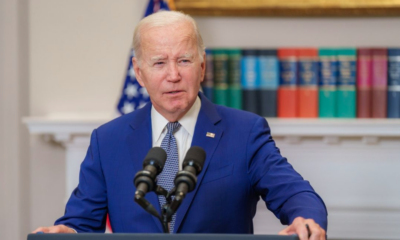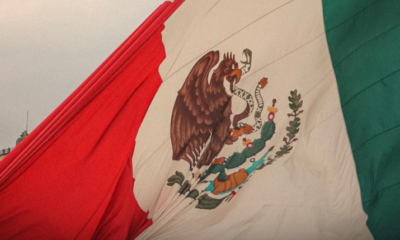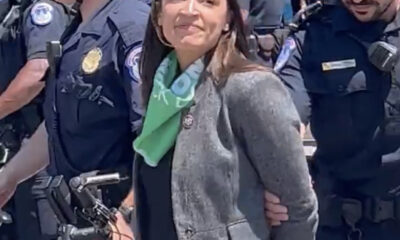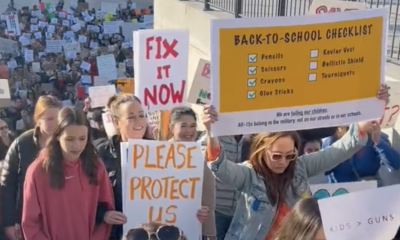NEWS
New York Establishes Committee To Consider Reparations For Slavery
Published
5 months agoon
By
Matthew Hall
Office of the Governor
New York Gov. Kathy Hochul on Tuesday signed a bill into law creating a commission to consider reparations for the descendants of enslaved people and the subsequent discrimination against New Yorkers of African descent.
Today, I challenge all New Yorkers to be the patriots and rebuke and not excuse our role in benefiting from the institution of slavery, Hochul, a Democrat, said at a bill signing ceremony in New York City on Tuesday.
“Many of us grew up in very homogeneous communities — all Black, all Brown, all Asian, all white, Hochul said. And sometimes it’s just difficult to expand beyond that, to embrace differences and experiences so foreign to us, so different. Understanding each other takes work, and we rarely get it right all at once. But I say this: it’s essential that we try.”
“Today marks a momentous occasion in New York history, Speaker of the Assembly Carl E. Heastie said in a statement. African Americans have been subjected to racial, economic, and institutional injustices that have plagued our communities for decades – a reality we must still acknowledge.
Today, we plant a seed of hope, not just for the City of New York and New York State, but for the nation, State Senator James Sanders said. The reparations commission it establishes is a vessel for truth, a platform for voices silenced for too long. Their findings will not be easy, but they will be necessary.
Hochul said that in New York, we like to think were on the right side of this. Slavery was a product of the South, of the Confederacy.
“What is hard to embrace is the fact that our state also flourished from that slavery, Hochul said.
She said that as many as 20% of colonial New Yorkers were enslaved Africans. And as New York became an economic center, Wall Street, banking, shipping, and insurance thrived because they can trade in commodities that were produced by slaves.
And there was a slave market. Yes, here in New York, there was a slave market where people bought and sold other human beings with callous disregard. It happened right on Wall Street for more than a century. And even though it officially closed when slavery was abolished in New York in 1827, our state still remained a dominant player in the illegal slave trade, Hochul said.
It’s not a beautiful story, but indeed it is the truth, she said of New York’s history.
And even after the long, hard road of the Civil Rights Movement, it wasn’t until 2009 that Congress even apologized for the institution of slavery, Hochul said. Now, if someone had kidnapped, beaten, enslaved, or murdered a member of my family, I think I would have wanted an apology at bare minimum.
The nine-member commission will study the ongoing effects of the institution of slavery on the Black New Yorkers of today. They will be required to file a report on their findings one year after their first meeting. Their non-binding recommendation may include monetary compensation, or it could include policies or programs aimed at remedying the ongoing effects of slavery.
I know the word reparations brings up a lot of conflicting ideas for people. A lot of people instinctively dig in when they hear it without really thinking about what it means or why we need to talk about it, Hochul said.
If this committee can present a viable path forward to helping the descendants of New York slaves and addressing the harms and disparities that exist in education, that exist in housing, that exist in healthcare, that exist in the environment, that, my friends, will lift all of us up, Hochul said. It’ll strengthen our economy. It’ll strengthen our communities. It’ll strengthen the bonds that bring us closer together. That’s what can happen.
TMX contributed to this article.
More From Politically+
-


More: U.S. Airstrikes On Yemen Cause Outrage Amongst Demonstrators In…
-


Canada: Pro-Palestine Gathering In Montréal, some 5000 Montréalers marched today…
-


President Biden Announces Another $9 Billion in Student Debt Relief…
-


PETA Calls On Jill Biden To Use Potatoes For Annual…
-


More: Hundreds of Roe V. Wade Supporters Protest in Austin,…
-


Rep. Dan Goldman Protest – Just now: Protesters in Brooklyn…
-


Belgium: 🚜 🇪🇺 Hundreds of #farmers have driven their #tractors…
-


Mexico’s Supreme Court Decriminalizes Abortion At Federal Level
-


DC – People Tumble Off Stage as Climate Activists Disrupt…
-


Early Ballots Being Printed In Maricopa County, AZ
-


“@AOC has just been escorted by police away from the…
-


Protesters Demand Gun Control At Tennessee State Capitol
